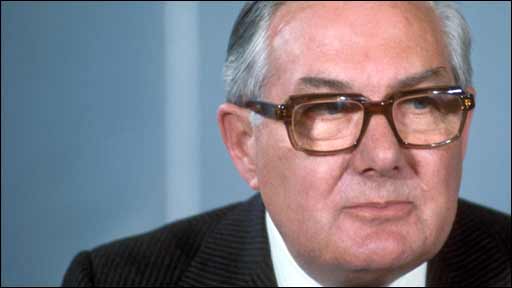1972 - Year of Tension
January 1st 1972 - Kurt Waldheim becomes Secretary General of the United Nations
January 13th 1972 - Roy Jenkins announces his resignation as Prime Minister of Great Britain
January 21st 1972 - Upon his election as Leader of the Labour Party, Jim Callaghan becomes Prime Minister
January 21st 1972 - Callaghan announces he will reshuffle the Jenkins Cabinet, in it both Chancellor William Rodgers, Transport Secretary John Morris and Home Secretary Barbara Castle resign while Foreign Secretary Peter Shore is sacked. Alice Bacon becomes the first female Foreign Secretary. All of those who resigned in the October 1971 "Night of the Long Knives" are promoted back into Cabinet
The Callaghan Ministry
First Cabinet
21st January 1972
Prime Minister and First Lord of the Treasury – James Callaghan
Deputy Prime Minister – John Diamond
Lord Chancellor – Lord Shackleton
Leader of the House of Commons – Judith Hart
Leader of the House of Lords – Lord Stewart
Chancellor of the Exchequer – John Diamond
Secretary of State for Foreign and Commonwealth Affairs – Alice Bacon
Secretary of State for the Home Department – Tony Benn
President of the Board of Trade – Roy Hattersley
Secretary of State for Technology and Industry – Dickson Mabon
Secretary of State for Employment and Productivity – Reginald Prentice
Secretary of State for Local Government – Edward Short
Secretary of State for Education and Science – David Owen
Secretary of State for Social Services – David Ennals
Secretary of State for Transport – Roy Mason
Secretary of State for Defence – Fred Mulley
Minister for Overseas Development – Lord Gardiner
Minister for Agriculture, Fisheries and Food – Shirley Williams
Paymaster General – Fred Peart
Chief Secretary to the Treasury – Merlyn Rees
Secretary of State for Scotland – William Ross
Secretary of State for Wales – George Thomas
Secretary of State for Northern Ireland - Robert Mellish
Attorney General – Sir Elwyn Jones
Parliamentary Secretary to the Treasury and Chief Whip – Richard Marsh
Chancellor of the Duchy of Lancaster and Minister for Industrial Relations - Post removed from Cabinet
January 30th 1972 - Bloody Sunday in Northern Ireland, Prime Minister Callaghan orders troops in Northern Ireland to quell violent outbreak. 6 unarmed are killed by the IRA mortar attacks with 2 soldiers dying. For the IRA, 20 of their men are shot by the Army.
February 6th 1972 - In another test for the new government, the miner's threaten to strike leading Prime Minister Callaghan to strike an eleventh hour deal to prevent it but at huge criticism from Opposition Leader Reginald Maudling.
February 15th 1972 - Relations with the miner's break down and strikes begin, Callaghan declares a state of emergency until such time a deal can be made to resume service
March 1st 1972 - The state of emergency is lifted after a contract is signed between the unions and the government pledging equal partnership. Many in the Opposition are uneasy about such a binding right.
March 13th 1972 - In the wake of President Nixon's visit to China, Britain and China elevate diplomatic levels to ambassadorial for the first time in 22 years.
March 25th 1972 - In a break with diplomatic protocol, Prime Minister Callaghan says in public that he believes the Vietnam War to be flawed and dangerous and that Britain will not enter as long as he is Prime Minister. This causes anger from US politicians and diplomats
April 3rd 1972 - In a public statement, the Government announces it is suspending the space program launchers in Britain due to lack of funds available but says it will co-operate with Europe on a European shuttle sometime in the next decade.
April 27th 1972 - In his first interview since being deposed as Prime Minister, Roy Jenkins talks of his achievements in improving the economy and tackling the unions of which he says his successor is taking an axe to. This is interpreted as an attack on the new PM.
May 10th 1972 - Local elections see moderate returns for Labour but being beaten in marginal areas by the Conservatives.
May 30th 1972 - The Angry Bridge go on trial at the high court for their large crimes.
June 8th 1972 - In a shocking development; former Cabinet members John Morris, William Rodgers and Barbara Castle leave the Labour Party to form the Social Libertarian Party, better known as the SLP. Along with them, ten other Labour MP's also defect to the new SLP. Castle assumes the mantle of interim Party Leader until their first conference in September.
June 14th 1972 - In a further blow to the Labour Party, former Chancellor and Foreign Secretary Peter Shore joins the SLP. Many speculate that Roy Jenkins will be the next high profile MP to defect.
June 23rd 1972 - True to form, Roy Jenkins defects to the SLP. In timing with his departure, nine further Labour MP's defect also, all of them loyalists to the Jenkins administration and the members that left Callaghan's Cabinet at the start of the year
Seat Totals as of June 1972
Labour - 303
Conservative - 274
Social Libertarian - 24
Liberal - 21
SNP - 5
Plaid Cymru - 2
Labour Majority of 35
July 3rd 1972 - James Callaghan dissolves Parliament in preparation for an early general election to be held on July 27th 1972 in order to quell further unrest in the Labour Party. Polls show that the Conservatives narrowly lead over Labour with the SLP a close third...
To Be Continued

